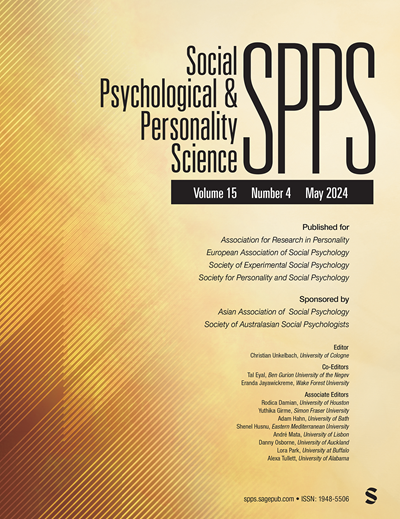权力平衡与关系质量:被夸大的联系
IF 3.3
2区 心理学
Q1 PSYCHOLOGY, SOCIAL
引用次数: 0
摘要
权力平衡,即关系伴侣之间潜在影响力水平相等,与关系幸福与否有关。本研究采用二元响应面分析法(总人数 = 879 对情侣)研究了权力平衡是否真的与情侣双方的关系质量(RQ)正相关。在研究 1 至 3 中,我们发现权力对 RQ 有线性影响,但没有相似性影响。体验权力与行为者和伴侣的 RQ 都呈正相关。在研究 4 中,我们同样没有发现权力对性满足的相似性效应,但发现了行为者和伴侣的效应。这些研究结果表明,以往研究中发现的权力平衡与 RQ 之间的联系并不能通过复杂的分析技术(如差异分数)来解决。事实上,影响 RQ 和性满意度的是经验权力的绝对水平,而不是权力平衡。实践者可以将目标放在加强个人的权力上,而不是关注权力平衡问题。本文章由计算机程序翻译,如有差异,请以英文原文为准。
Power Balance and Relationship Quality: An Overstated Link
Power balance, that is, equal levels of potential influence between relationship partners, has been linked to relationship happiness. This study examined whether power balance is indeed positively related to relationship quality (RQ) for both couple members using dyadic response surface analysis (total N = 879 couples). In Studies 1 to 3, we found linear but no similarity effects of power on RQ. Experiencing power was positively related to both actor’s and partner’s RQ. In Study 4, again, no similarity but actor and partner effects were found on sexual satisfaction. These findings show that the link between power balance and RQ found in previous research does not hold with sophisticated analysis techniques that overcome issues of previous approaches (e.g., difference scores). In fact, the absolute level of experienced power, not power balance, matters for both RQ and sexual satisfaction. Practitioners may target strengthening an individual’s power instead of focusing on issues of power balance.
求助全文
通过发布文献求助,成功后即可免费获取论文全文。
去求助
来源期刊

Social Psychological and Personality Science
PSYCHOLOGY, SOCIAL-
CiteScore
12.50
自引率
1.80%
发文量
77
期刊介绍:
Social Psychological and Personality Science (SPPS) is a distinctive journal in the fields of social and personality psychology that focuses on publishing brief empirical study reports, typically limited to 5000 words. The journal's mission is to disseminate research that significantly contributes to the advancement of social psychological and personality science. It welcomes submissions that introduce new theories, present empirical data, propose innovative methods, or offer a combination of these elements. SPPS also places a high value on replication studies, giving them serious consideration regardless of whether they confirm or challenge the original findings, with a particular emphasis on replications of studies initially published in SPPS. The journal is committed to a rapid review and publication process, ensuring that research can swiftly enter the scientific discourse and become an integral part of ongoing academic conversations.
 求助内容:
求助内容: 应助结果提醒方式:
应助结果提醒方式:


